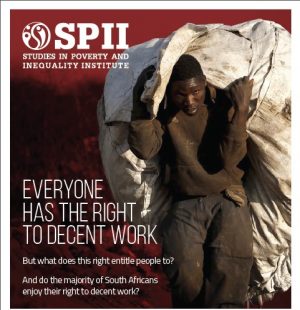Access to decent work has been an ongoing struggle in South Africa for more than 300 years. Colonialism and apartheid brought many forms of deprivation to indigenous South Africans, including a loss of productive lands, the devastation of community and local economies, and the relegation of ‘non-whites’ to second class citizens. Punitive taxes, racist education and brute force combined to force Blacks to become low-paid labourers in the country’s white-owned industries, particularly mining. The establishment of a migrant labour system, a large reserve labour force and a two-tier employment system were key goals of both the colonial and apartheid systems of government. The democratic government thus inherited a highly unequal economy in which Whites inhabited the vast majority of positions of power and were able to command decent wages and conditions of employment, while the majority had little-to-no access to decent work.
2018 01 21 SPII Right to Work_Complete (2)












